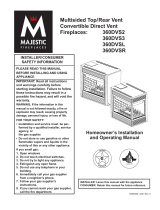
3
10003929
When the unit is installed into a woodburning fireplace, the
minimum distance the mantel can be placed above the
fireplace is governed by local building codes applicable to
woodburning fireplaces. Consult local authorities having
jurisdiction for these clearances. The underside of the
mantel will become warm. Use only finishes which are heat
resistant and do not discolour.
MANTELS
IMPORTANT:
PLEASE REVIEW THE FOLLOWING
CAREFULLY
It is normal for fireplaces fabricated of steel to
give off some expansion and/or contraction
noises during the start up or cool down cycle.
Similar noises are found with your furnace heat
exchanger or car engine.
It is not unusual for your Irving Oil gas fireplace
to give off some odour the first time it is burned.
This is due to the curing of the paint and any
undetected oil from the manufacturing process.
Please ensure that your room is well
ventilated - open all windows.
It is recommended that you burn your Irving Oil
fireplace for a least ten (10) hours the first time
you use it. If optional fan kit has been installed,
place fan in the "OFF" position during this time.
This gas appliance should be installed by a qualified
installer in accordance with local building codes and with
current CSA-B149.1 or .2 Installation codes for Gas Burning
Appliances and Equipment.
FOR U.S.A Installations follow local codes and/or the current
National Fuel Gas Code. ANSI Z223.1.
FOR SAFE INSTALLATION AND OPERATION OF
YOUR IRVING OIL GAS FIREPLACE PLEASE NOTE
THE FOLLOWING:
1 . This appliance gives off high temperatures and
should be located out of high traffic areas and away
from furniture and draperies.
2. Children and adults should be alerted to the hazards
of the high surface temperatures of this appliance
and should stay away to avoid burns or ignition of
clothing.
3. Children should be carefully supervised when they
are in the same room as your appliance.
4. Under no circumstances should this appliance be
modified. Parts removed for servicing should be
replaced prior to operating this appliance again.
5. Installation and any repairs to this appliance should
be carried out by a qualified service person. A
professional service person should be contacted to
inspect this appliance annually. Make it a practice to
have all of your gas appliances checked annually.
More frequent cleaning may be required due to
excess lint and dust from carpeting, bedding
material, etc.
6. Control compartments, burners and air passages in
this appliance should be kept clean and free of dust
and lint. Make sure that the gas valve and pilot light
are turned off before you attempt to clean this unit.
7. The venting system (chimney) of this appliance
should be checked at least once a year and if
needed your venting system should be cleaned.
8. Keep the area around your appliance clear of
combustible materials, gasoline and other flamma-
ble vapour and liquids. This appliance should not be
used as a drying rack for clothing, nor should
Christmas stockings or decorations be hung in the
area of it.
9. Under no circumstances should any solid fuels
(wood, coal, paper or cardboard etc.) be used in this
appliance.
10.The flow of combustion and ventilation air fan must
not be obstructed in any way.
Before installing the gas fireplace insert consideration must
be given to the functioning needs of the fireplace. The size
of the fireplace cavity size (min. 28-3/4"W x 21-1/4"H x 16"
D), the design of the chimney (a minimum size of 8" x 12"
is necessary to accomadate the two (2) 3" liners). The
availability of the gas supply as well as electricity for the
insert fan must be confirmed.
Your Direct Vented Insert unit was de-
signed to be installed in an existing
woodburning fireplace. The location and
clearances are therefore subject to your
local building codes.
Your Direct Vented Insert unit is designed
to be vented vertically only with a mini-
mum height of 12 feet.
LOCATING YOUR
IRVING OIL
GAS
FIREPLACE INSERT
INSERT APPLICATIONS
INSTALLATION INSTRUCTIONS





















